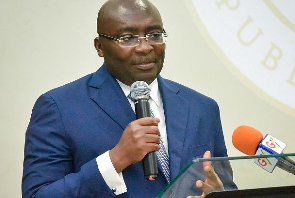Vice President, Dr Mahamudu Bawumia, has reminded business owners gathered at the ongoing Africa Prosperity Dialogue that this is the time for businesses to dialogue on smart ways to enjoy the opportunities from the agreement for a resilient, sustainable, inclusive and prosperous Africa.
According to him, this event has been organised as a solution-driven initiative to fast-track the implementation of the African Continental Free Trade Agreement.
He said for most parts of the world, the narrative about this beautiful continent has, sadly, been about poverty, conflict, misgovernance, corruption and underdevelopment.
“The time has come for Africa and Africans to define our own narrative. We cannot allow poverty and underdevelopment to be the destiny of Africa, a continent so blessed with every natural resource imaginable – oil, gas, minerals, and sunshine."
“We have approximately 65% of all available arable land available to feed 9 billion people globally by 2050 and we are home to the most youthful population in the world."
“We have everything we need to transform Africa into a global powerhouse of the future,” he said.
He explained Africa only accounts for about three per cent of global trade and intra-African trade is one of the lowest of any region globally.
This, he said is largely due to the “colonial” economic model characterised by small individual economies, fragmented and disconnected regional markets, over-reliance and low productive capacities that we have practised for 60 years.
“As growing economies, we often struggle to attract much-needed investments.
“However, with the collaborated strength from all 55 Member States, we have a population of 1.2 billion, the majority of whom are young, and a GDP of US$ 2.5 trillion, making Africa the eighth (8th) largest economy in the world,” he said.
He noted that this positions Africa as an attractive investment destination. “With the right investment, we will be able to sustain economic growth and create the job opportunities that the continent desperately needs,” he added.
The Vice President admitted that AfCFTA is a real game-changer, and once fully realised: “We can increase intra-African trade by some US$ 35 billion and reduce external imports by some US$ 10 billion annually.
“This will mean more opportunities for growth for our small businesses and the potential to lift more than three million people out of poverty.”
He made this call at the Kwahu Summit ongoing at the Safari Valley in the Eastern Region.
He explained that like the vision of our forebears, the African Continental Free Trade Area has set the stage for Africa’s industrialisation drive, but, it will take concrete, strategic actions by governments and businesses on the continent, the right mix of policies, a greater sense of purpose for more robust intra-African trade to happen to support economic diversification and the much-needed industrialisation of the continent.
To bring about the transformation needed, he proposed three broad areas that need to be prioritised.
First is the need for smart investments in critical infrastructure. “As a continent, we need to produce and trade our way out of poverty and underdevelopment, and we cannot do that without investing in smart infrastructure across the continent.
“While the last decades have seen some positive investments, there is the need for additional resources to finance the ‘arteries for trade’, which include the physical infrastructure such as roads, rail, and energy; digital infrastructure such as data centres to facilitate the digital transformation and financial infrastructure to allow for integrated financial markets.
“These investments will be critical to delivering the success of the AfCFTA.”
The second is to unleash productive capacities across the continent.
With that Dr Bawumia explained that “We must create platforms for knowledge brokerage and access to information on critical products and services on the continent to allow 445 million small businesses across the continent to plug into the value chains of these mega industries.”
For his part, the founder and Chairman of Africa Prosperity Network, the organisers of the Africa Prosperity Dialogues, Mr Gabby Otchere-Darko thanked all the participants for choosing to be part of this historic gathering.
According to him, this is historic because Africa is creating the right environment for the private sector to join forces to assert a leading voice and play the leadership role in how best and how fast the continent can build and drive a vibrant, single market in Africa and for the shared prosperity of Africa’s nearly 1.4 billion citizens.
He revealed that next month, Africa’s political leaders will once again meet in Addis Ababa, to talk about the continent's common destiny.
“Our voices here in Adukrom should resonate in Ethiopia. This year, incidentally, marks the 60th anniversary of the Organisation of African Unity, which was set up to promote the unity and solidarity of the African States."
Business News of Thursday, 26 January 2023
Source: classfmonline.com

















